Regulatory Agencies in Healthcare: AMCP and FDA Analysis
VerifiedAdded on 2023/06/07
|5
|985
|485
Report
AI Summary
This report examines the role of regulatory agencies, specifically the Academy of Managed Care Pharmacy (AMCP) and the Food and Drug Administration (FDA), in the healthcare industry. It details the AMCP's mission to improve healthcare through sound medication management and its focus on serving a large population. The report highlights the FDA's oversight of the AMCP, emphasizing the agencies' responsibilities in protecting public health, ensuring compliance, and advancing healthcare innovations. It explores how regulatory agencies support healthcare by ensuring quality services, promoting compliance, and protecting stakeholders. A relevant healthcare issue, the provision of low-quality drugs, is discussed in relation to the AMCP's role in regulating medication quality. Finally, the report evaluates the AMCP's ability to meet legal and ethical requirements, aligning with principles of non-maleficence and beneficence, and referencing relevant literature.
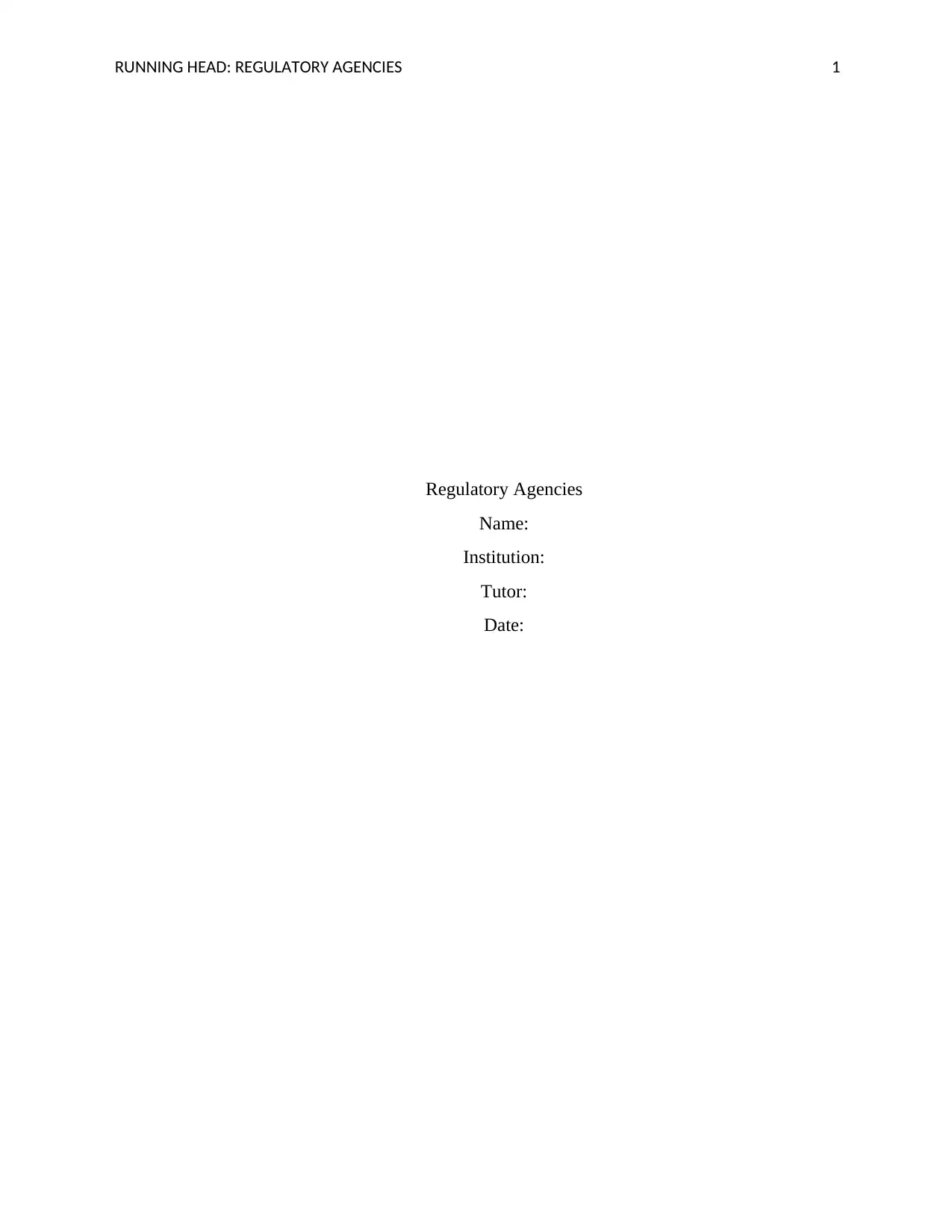
RUNNING HEAD: REGULATORY AGENCIES 1
Regulatory Agencies
Name:
Institution:
Tutor:
Date:
Regulatory Agencies
Name:
Institution:
Tutor:
Date:
Paraphrase This Document
Need a fresh take? Get an instant paraphrase of this document with our AI Paraphraser
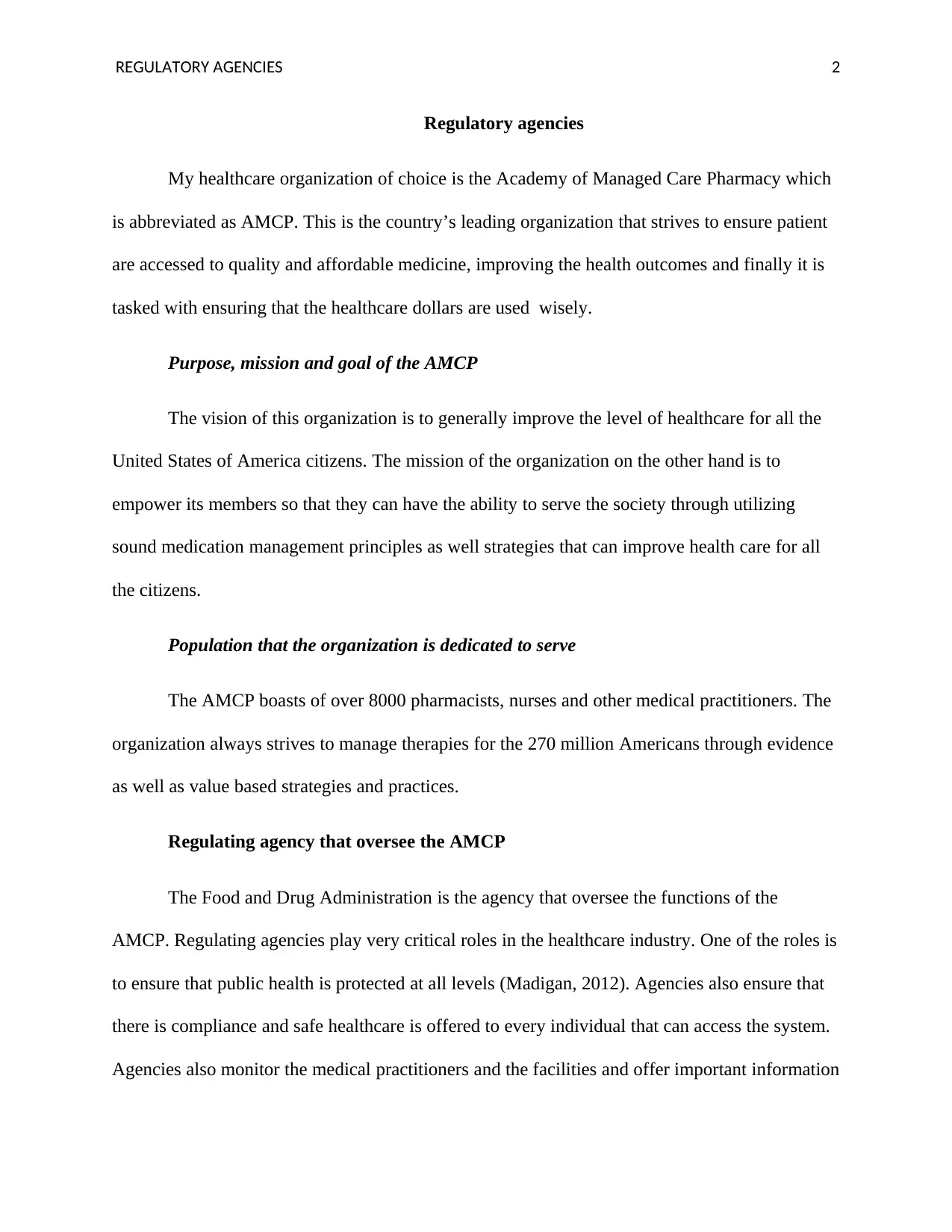
REGULATORY AGENCIES 2
Regulatory agencies
My healthcare organization of choice is the Academy of Managed Care Pharmacy which
is abbreviated as AMCP. This is the country’s leading organization that strives to ensure patient
are accessed to quality and affordable medicine, improving the health outcomes and finally it is
tasked with ensuring that the healthcare dollars are used wisely.
Purpose, mission and goal of the AMCP
The vision of this organization is to generally improve the level of healthcare for all the
United States of America citizens. The mission of the organization on the other hand is to
empower its members so that they can have the ability to serve the society through utilizing
sound medication management principles as well strategies that can improve health care for all
the citizens.
Population that the organization is dedicated to serve
The AMCP boasts of over 8000 pharmacists, nurses and other medical practitioners. The
organization always strives to manage therapies for the 270 million Americans through evidence
as well as value based strategies and practices.
Regulating agency that oversee the AMCP
The Food and Drug Administration is the agency that oversee the functions of the
AMCP. Regulating agencies play very critical roles in the healthcare industry. One of the roles is
to ensure that public health is protected at all levels (Madigan, 2012). Agencies also ensure that
there is compliance and safe healthcare is offered to every individual that can access the system.
Agencies also monitor the medical practitioners and the facilities and offer important information
Regulatory agencies
My healthcare organization of choice is the Academy of Managed Care Pharmacy which
is abbreviated as AMCP. This is the country’s leading organization that strives to ensure patient
are accessed to quality and affordable medicine, improving the health outcomes and finally it is
tasked with ensuring that the healthcare dollars are used wisely.
Purpose, mission and goal of the AMCP
The vision of this organization is to generally improve the level of healthcare for all the
United States of America citizens. The mission of the organization on the other hand is to
empower its members so that they can have the ability to serve the society through utilizing
sound medication management principles as well strategies that can improve health care for all
the citizens.
Population that the organization is dedicated to serve
The AMCP boasts of over 8000 pharmacists, nurses and other medical practitioners. The
organization always strives to manage therapies for the 270 million Americans through evidence
as well as value based strategies and practices.
Regulating agency that oversee the AMCP
The Food and Drug Administration is the agency that oversee the functions of the
AMCP. Regulating agencies play very critical roles in the healthcare industry. One of the roles is
to ensure that public health is protected at all levels (Madigan, 2012). Agencies also ensure that
there is compliance and safe healthcare is offered to every individual that can access the system.
Agencies also monitor the medical practitioners and the facilities and offer important information
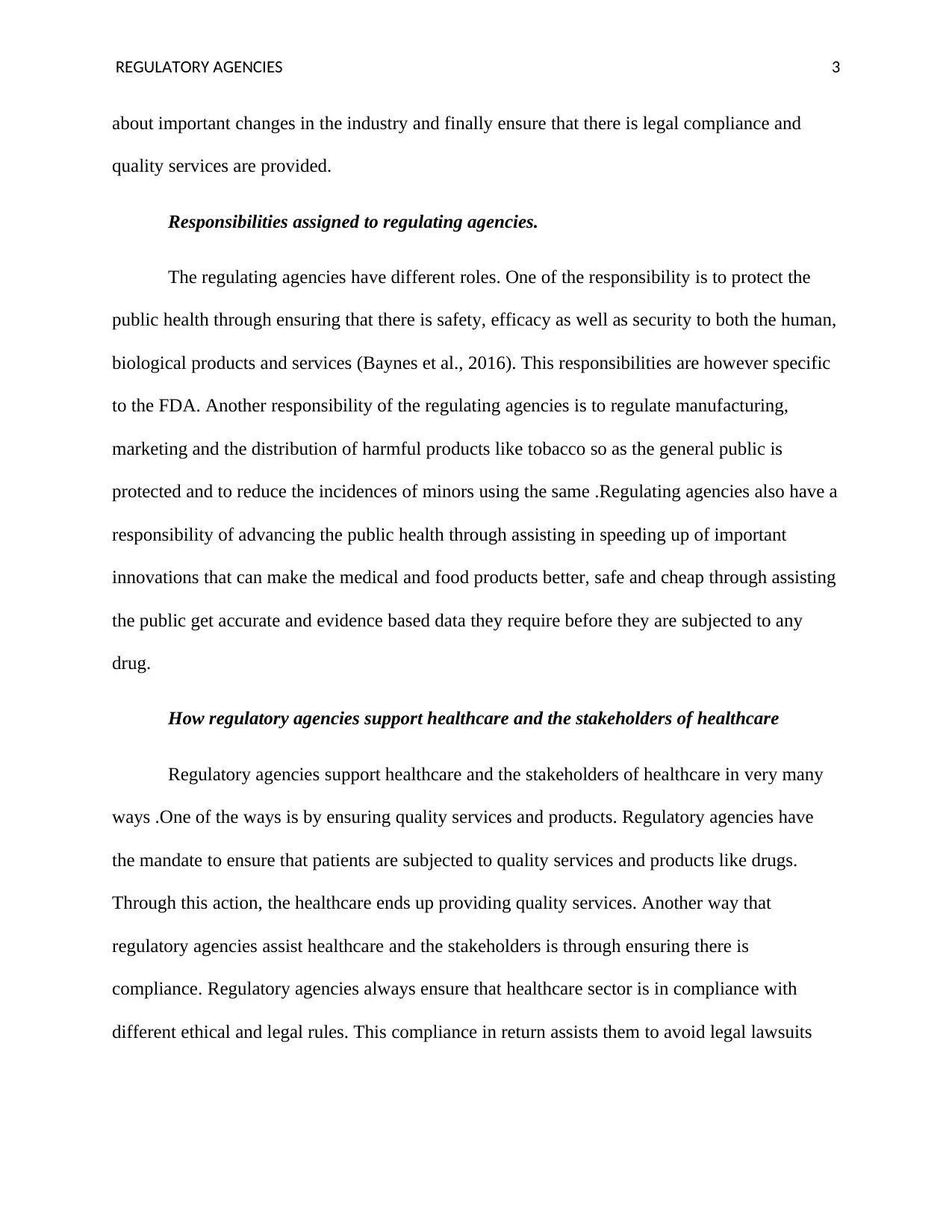
REGULATORY AGENCIES 3
about important changes in the industry and finally ensure that there is legal compliance and
quality services are provided.
Responsibilities assigned to regulating agencies.
The regulating agencies have different roles. One of the responsibility is to protect the
public health through ensuring that there is safety, efficacy as well as security to both the human,
biological products and services (Baynes et al., 2016). This responsibilities are however specific
to the FDA. Another responsibility of the regulating agencies is to regulate manufacturing,
marketing and the distribution of harmful products like tobacco so as the general public is
protected and to reduce the incidences of minors using the same .Regulating agencies also have a
responsibility of advancing the public health through assisting in speeding up of important
innovations that can make the medical and food products better, safe and cheap through assisting
the public get accurate and evidence based data they require before they are subjected to any
drug.
How regulatory agencies support healthcare and the stakeholders of healthcare
Regulatory agencies support healthcare and the stakeholders of healthcare in very many
ways .One of the ways is by ensuring quality services and products. Regulatory agencies have
the mandate to ensure that patients are subjected to quality services and products like drugs.
Through this action, the healthcare ends up providing quality services. Another way that
regulatory agencies assist healthcare and the stakeholders is through ensuring there is
compliance. Regulatory agencies always ensure that healthcare sector is in compliance with
different ethical and legal rules. This compliance in return assists them to avoid legal lawsuits
about important changes in the industry and finally ensure that there is legal compliance and
quality services are provided.
Responsibilities assigned to regulating agencies.
The regulating agencies have different roles. One of the responsibility is to protect the
public health through ensuring that there is safety, efficacy as well as security to both the human,
biological products and services (Baynes et al., 2016). This responsibilities are however specific
to the FDA. Another responsibility of the regulating agencies is to regulate manufacturing,
marketing and the distribution of harmful products like tobacco so as the general public is
protected and to reduce the incidences of minors using the same .Regulating agencies also have a
responsibility of advancing the public health through assisting in speeding up of important
innovations that can make the medical and food products better, safe and cheap through assisting
the public get accurate and evidence based data they require before they are subjected to any
drug.
How regulatory agencies support healthcare and the stakeholders of healthcare
Regulatory agencies support healthcare and the stakeholders of healthcare in very many
ways .One of the ways is by ensuring quality services and products. Regulatory agencies have
the mandate to ensure that patients are subjected to quality services and products like drugs.
Through this action, the healthcare ends up providing quality services. Another way that
regulatory agencies assist healthcare and the stakeholders is through ensuring there is
compliance. Regulatory agencies always ensure that healthcare sector is in compliance with
different ethical and legal rules. This compliance in return assists them to avoid legal lawsuits
⊘ This is a preview!⊘
Do you want full access?
Subscribe today to unlock all pages.

Trusted by 1+ million students worldwide
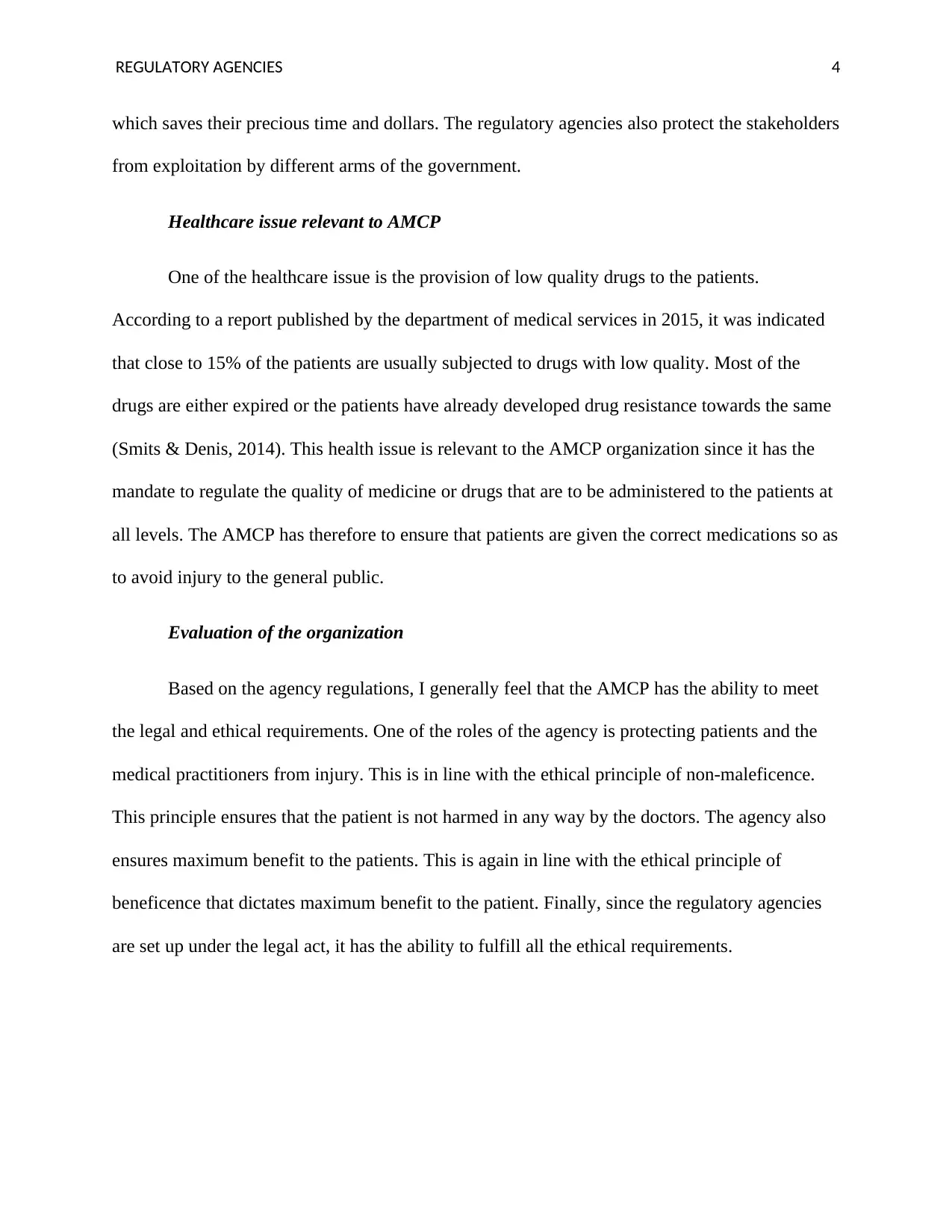
REGULATORY AGENCIES 4
which saves their precious time and dollars. The regulatory agencies also protect the stakeholders
from exploitation by different arms of the government.
Healthcare issue relevant to AMCP
One of the healthcare issue is the provision of low quality drugs to the patients.
According to a report published by the department of medical services in 2015, it was indicated
that close to 15% of the patients are usually subjected to drugs with low quality. Most of the
drugs are either expired or the patients have already developed drug resistance towards the same
(Smits & Denis, 2014). This health issue is relevant to the AMCP organization since it has the
mandate to regulate the quality of medicine or drugs that are to be administered to the patients at
all levels. The AMCP has therefore to ensure that patients are given the correct medications so as
to avoid injury to the general public.
Evaluation of the organization
Based on the agency regulations, I generally feel that the AMCP has the ability to meet
the legal and ethical requirements. One of the roles of the agency is protecting patients and the
medical practitioners from injury. This is in line with the ethical principle of non-maleficence.
This principle ensures that the patient is not harmed in any way by the doctors. The agency also
ensures maximum benefit to the patients. This is again in line with the ethical principle of
beneficence that dictates maximum benefit to the patient. Finally, since the regulatory agencies
are set up under the legal act, it has the ability to fulfill all the ethical requirements.
which saves their precious time and dollars. The regulatory agencies also protect the stakeholders
from exploitation by different arms of the government.
Healthcare issue relevant to AMCP
One of the healthcare issue is the provision of low quality drugs to the patients.
According to a report published by the department of medical services in 2015, it was indicated
that close to 15% of the patients are usually subjected to drugs with low quality. Most of the
drugs are either expired or the patients have already developed drug resistance towards the same
(Smits & Denis, 2014). This health issue is relevant to the AMCP organization since it has the
mandate to regulate the quality of medicine or drugs that are to be administered to the patients at
all levels. The AMCP has therefore to ensure that patients are given the correct medications so as
to avoid injury to the general public.
Evaluation of the organization
Based on the agency regulations, I generally feel that the AMCP has the ability to meet
the legal and ethical requirements. One of the roles of the agency is protecting patients and the
medical practitioners from injury. This is in line with the ethical principle of non-maleficence.
This principle ensures that the patient is not harmed in any way by the doctors. The agency also
ensures maximum benefit to the patients. This is again in line with the ethical principle of
beneficence that dictates maximum benefit to the patient. Finally, since the regulatory agencies
are set up under the legal act, it has the ability to fulfill all the ethical requirements.
Paraphrase This Document
Need a fresh take? Get an instant paraphrase of this document with our AI Paraphraser
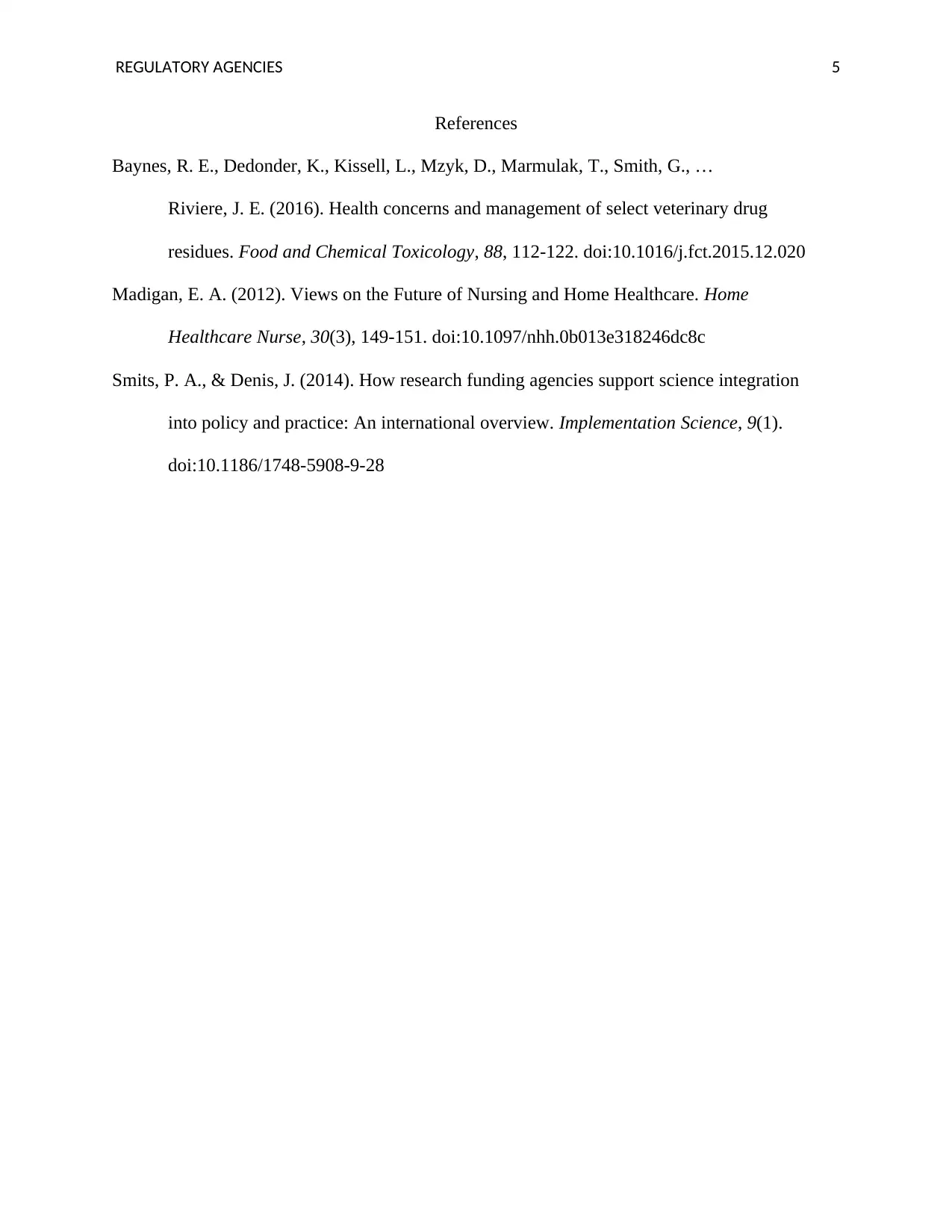
REGULATORY AGENCIES 5
References
Baynes, R. E., Dedonder, K., Kissell, L., Mzyk, D., Marmulak, T., Smith, G., …
Riviere, J. E. (2016). Health concerns and management of select veterinary drug
residues. Food and Chemical Toxicology, 88, 112-122. doi:10.1016/j.fct.2015.12.020
Madigan, E. A. (2012). Views on the Future of Nursing and Home Healthcare. Home
Healthcare Nurse, 30(3), 149-151. doi:10.1097/nhh.0b013e318246dc8c
Smits, P. A., & Denis, J. (2014). How research funding agencies support science integration
into policy and practice: An international overview. Implementation Science, 9(1).
doi:10.1186/1748-5908-9-28
References
Baynes, R. E., Dedonder, K., Kissell, L., Mzyk, D., Marmulak, T., Smith, G., …
Riviere, J. E. (2016). Health concerns and management of select veterinary drug
residues. Food and Chemical Toxicology, 88, 112-122. doi:10.1016/j.fct.2015.12.020
Madigan, E. A. (2012). Views on the Future of Nursing and Home Healthcare. Home
Healthcare Nurse, 30(3), 149-151. doi:10.1097/nhh.0b013e318246dc8c
Smits, P. A., & Denis, J. (2014). How research funding agencies support science integration
into policy and practice: An international overview. Implementation Science, 9(1).
doi:10.1186/1748-5908-9-28
1 out of 5
Related Documents
Your All-in-One AI-Powered Toolkit for Academic Success.
+13062052269
info@desklib.com
Available 24*7 on WhatsApp / Email
![[object Object]](/_next/static/media/star-bottom.7253800d.svg)
Unlock your academic potential
Copyright © 2020–2026 A2Z Services. All Rights Reserved. Developed and managed by ZUCOL.





